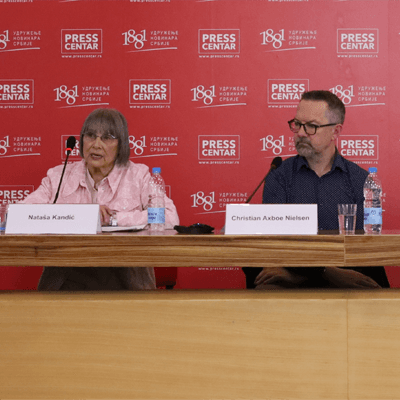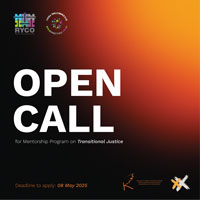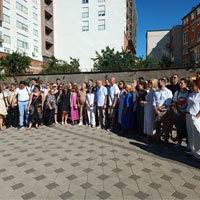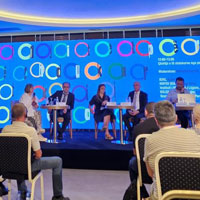In Conversation with Historian Christian Nielsen
Conducted by Nataša Kandić, Humanitarian Law Center
Belgrade, September 26, 2025
Christian Axboe Nielsen:
We must ask ourselves: what would this region and the world look like today without the Hague Tribunal – without its judgments, without its investigations, without the discovery of mass graves? The Tribunal did not bring closure, but it opened the space for truth and accountability.
The Hague Tribunal Between Truth and Politics
Nataša Kandić:
Good afternoon, everyone. There are not many of us in this room, but for those of us working in the field of transitional justice, today is a special day — after almost a year, we are once again in Belgrade discussing the past, the Hague Tribunal, the archives, and transitional justice.
We have the opportunity to talk about all this with the Danish historian Christian Nielsen, a profound expert on the wars in the territory of the former Yugoslavia and an expert witness in the cases of Karadžić, Stanišić and Simatović, as well as other cases before the Hague Tribunal. His book Mass Atrocities and the Police shows how the preparations for war unfolded and how the police were transformed from an institution ensuring order and peace on the streets into a military force. He holds a clear and open position on the impact of the Tribunal’s judgments on attitudes toward the past.
Nataša Kandić:
Let’s begin with the issue of confronting the past. Croatian historian Hrvoje Klasić believes that judgments do not change attitudes toward the past. Erik Gordy also argues that the Hague Tribunal’s verdicts cannot alter the entrenched narratives produced by politicians in the region. William Schabas writes that the idea of the Tribunal’s contribution to peace and reconciliation is misguided because the court’s role is simply to determine whether the accused is guilty or not and to issue a judgment — nothing more. You said that you partially agree with Klasić — where do you differ?
Christian Nielsen:
When we speak about the legacy of the Hague Tribunal, I think that the architects of the court were overly optimistic in believing that its judgments would permanently change the interpretation of the events in the former Yugoslavia.
But we should not go to the other extreme and claim that those judgments are meaningless. No one is so naïve as to believe that the Nuremberg judgments prevented Holocaust denial.
We must ask ourselves: what would the world look like without the Hague Tribunal, without its judgments, without its investigations? The Tribunal was not only about verdicts — it uncovered documentation, facts, and even mass graves.
If the public rejects the narrative of the Hague Tribunal, we need to understand why. Politicians and the media often treat it like a buffet table — taking what suits them and discarding what doesn’t.
Nataša Kandić:
Can criminal justice contribute to reconciliation if trials are held in the absence of the accused?
Christian Nielsen:
I believe that trials in absentia are a major mistake. I cannot speak on behalf of victims, but it is incomparably more meaningful when the accused sits in the courtroom.
The “Obsession with Genocide” and Its Consequences
Nataša Kandić:
In several of your articles, you deal with genocide in the context of international criminal justice. In one article, you write that “an excessive focus on the term represents a wrong and counterproductive approach to the analysis of mass violence.” Discussions revolving around the “genocide or not” dichotomy, you say, do not advance our understanding of the war in Bosnia and Herzegovina.
You use the term “constant obsession with genocide” and conclude that this label has a distorting effect on international criminal justice. Is that position essentially a critique of the media and political use of the term?
As a historian, do you see any difference in the pain of a mother whose son was killed in Srebrenica — which the Hague Tribunal qualified as genocide — and that of a mother whose son was killed in an event classified as a war crime or a crime against humanity?
Christian Nielsen:
The author of the term “genocide,” Raphael Lemkin, said that it is especially horrific when a person is killed because of their religious, racial, or ethnic identity. Another great jurist, Hersch Lauterpacht, was a stronger advocate of focusing on crimes against humanity, emphasizing that the victim is a human being — an individual — whereas for Lemkin, the victims were protected groups, peoples, and religions.
If we look at Srebrenica, thousands of people were killed because they were Muslims, or Bosniaks. Their identity, while they were alive, was reduced to their ethnicity — although they were much more than that, and some even held a skeptical attitude toward national identity.
You can see that on the memorials — the victim is often reduced to the “ultimate member” of a particular group.
The pain of a mother who lost her son is no lesser if the crime was not legally qualified as genocide. The hierarchy of crimes is wrong. There is no “light” crime.
Another problem is the competition in suffering — as if there were a gold medal for genocide. This creates new injustices and relativizes crimes against humanity and war crimes.
The Politicization of Genocide Recognition
Nataša Kandić:
In Serbia, there are no genocide trials before domestic war crimes courts because the authorities do not recognize the Hague Tribunal’s judgments on genocide in Srebrenica. How do you interpret this?
Christian Nielsen:
It is problematic that some politicians in this region believe that recognizing genocide means losing certain rights — even existential rights. They think that admitting genocide threatens the very existence of a nation.
Germany recognizes genocide, and no one is asking it to disappear. There is no logic in the claim that if Republika Srpska were to recognize the genocide in Srebrenica, it would lose its right to exist. On the contrary, facing the past strengthened Germany — and it would strengthen the Balkan countries as well.
The Hague Archives as an Archive of Justice and Memory
Nataša Kandić:
How important is the accessibility of the Hague archives for confronting the past in the countries of the former Yugoslavia?
Christian Nielsen:
The legacy of the Hague Tribunal is of immense importance, but it is up to us to preserve it. The archive should not be only an archive of justice, but also a source of knowledge, learning, and remembrance.
So far, the problem has not been access, but selectivity in its use. Even if the entire archive were made accessible to all countries of the former Yugoslavia, many would still choose only the documents about their own victims, while questions about “their own perpetrators” would be seen as attacks on history or national identity.
Without a culture of scholarly self-criticism and readiness to confront all sides of tragic historical periods, the archive itself will not change anything.
Regional Archive and RECOM
Nataša Kandić:
RECOM proposed a regional archive of all victims. Why did the EU not continue to support that idea?
Christian Nielsen:
I think the wars of the 1990s have become an “old topic.” Political and financial attention has shifted elsewhere.
But this is not only a Balkan problem — today everyone feels entitled not only to their opinions but also to their own facts. That is a global problem.
We can see that in the United States, where it has become dangerous within academia to deal with problematic aspects of one’s own history. In Florida, authorities deliberately target museums — even the Smithsonian — and remove from textbooks whatever they find inconvenient, whatever dark aspects of America’s past they wish to hide. That is a very dangerous trend.
The Role of the Police in the System of Crimes
Nataša Kandić:
In your book, you argue that the police were not a passive service but a key factor in the system of crimes. You point to documents of the State Security Service of Bosnia and Herzegovina and the State Security Service of Serbia showing that ethnically based police forces were being deliberately formed, despite warnings that this would lead to a “fratricidal war.”
Christian Nielsen:
The police were crucial — not only in Bosnia but also in Croatia and Slovenia. In many cases, the army evolved from the police.
The Hague archives contain documents of the State Security Service of Serbia from 1990 that openly discuss groups ready to commit genocide against the non-Serb population. They knew — but did not act. Soon after, those same people were allied with perpetrators, with paramilitary formations.
The document you refer to was prepared in the State Security Service of Bosnia and Herzegovina in September 1991. Its authors were Serbs. They concluded that the decentralization of internal affairs in BiH must be implemented, but in the same document explicitly stated that such a step would lead to a “fratricidal war.” They were willing to proceed with this plan with the support of the JNA and the Federal Ministry of the Interior, fully aware of the risks.
The result was the establishment of the Serbian Ministry of the Interior in Republika Srpska in late February 1992. As the evidence shows, this ministry, together with other institutions, played an important role — not only in the war but also in the commission of certain crimes.
This demonstrates the continuity of institutions in crime.
Conclusion
Nataša Kandić:
We cannot close the book on the past unless we read it to the end — never selectively.
Christian Nielsen:
Confronting the past does not take away identity; it purifies it. As Karl Jaspers said: the problem is not that some people committed crimes in our name — the problem arises if we fail to acknowledge it. If we do not acknowledge it, we become part of that crime.
About Christian Nielsen
Christian Axboe Nielsen teaches at Aarhus University in Denmark, in the Department of History and Classical Studies. He testified before the ICTY as an expert in the cases Stanišić and Župljanin, Stanišić and Simatović, Karadžić, and others.
His research focuses on the role of the police in mass atrocities, mechanisms of ethnic cleansing, and transitional justice policies.
He is the author of Mass Atrocities and the Police: A New History of Ethnic Cleansing in Bosnia and Herzegovina (2022).
You can watch the full recording of the conversation with historian Christian Nielsen in Serbian language here.








